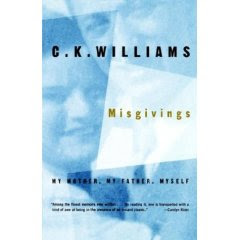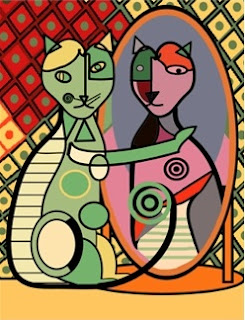>
 Thursday night was the third installment of the University of Memphis’s River City Writers Series (Sponsored by the MFA program,) this time featuring Pulitzer Prize-wining poet, C. K. Williams (Repair), who also won the National Book Critics Circle Award for Flesh and Blood and the National Book Award for The Singing. Impressive enough, but I was also drawn to hear him because of his memoir, Misgivings: My Mother, My Father, Myself. A man who writes poetry, fiction and creative non-fiction, teaches in the creative writing program at Princeton, and lives in Paris half the year. I’m game.
Thursday night was the third installment of the University of Memphis’s River City Writers Series (Sponsored by the MFA program,) this time featuring Pulitzer Prize-wining poet, C. K. Williams (Repair), who also won the National Book Critics Circle Award for Flesh and Blood and the National Book Award for The Singing. Impressive enough, but I was also drawn to hear him because of his memoir, Misgivings: My Mother, My Father, Myself. A man who writes poetry, fiction and creative non-fiction, teaches in the creative writing program at Princeton, and lives in Paris half the year. I’m game.  rance left me longing to hear Beth Ann Fennelly. Beth Ann doesn’t read her poetry at readings. She becomes the verse she speaks aloud to us, rarely looking down at the printed words on the podium. But the Powers That Be chose Mr. Williams’ verse for the Pulitzer, so I investigated further.
rance left me longing to hear Beth Ann Fennelly. Beth Ann doesn’t read her poetry at readings. She becomes the verse she speaks aloud to us, rarely looking down at the printed words on the podium. But the Powers That Be chose Mr. Williams’ verse for the Pulitzer, so I investigated further.One of my favorite poems is one he did not read Thursday night. It’s from the prize-winning volume, Repair. It’s called “The Dance.” (with apologies to Mr. Williams that blogspot doesn’t let me format the lines of his poem accurately….)
stout, to be more courteous still,
But when she and the rather good-looking, much younger man she’s with
get up to dance,
her forearm descends with such delicate lightness, such restrained but
confident ardor athwart his shoulder,
drawing him to her with such a firm, compelling warmth, and moving
him with effortless grace
into the union she’s instantly established with the not at all rhythmically
solid music in this second-rate café,
that something in the rest of us, some doubt about ourselves, some sad
conjecture, seems to be allayed,
nothing that we’d ever thought of as a real lack, nothing not to be
admired or be repentant for,
but something to which we’ve never adequately given credence,
which might have consoling implications about how we misbelieve
ourselves, and so the world,
that world beyond us which so often disappoints, but which sometimes
shows us, lovely, what we are.
Good stuff. But I was really wanting to get into his memoir, so I read the first half of it when I got home from the poetry reading. It’s really about the death of both of his parents, but also about how their lives affected him, and the universal elements of this experience, which he delivers with a strong poet’s voice. Here’s a short excerpt:
We see our lives so much as though through a lens that bends all the light of existence towards that tiny circle in the center of which we pose for ourselves. When we look at ourselves, though, and at those others once so near, as we’re cast against the shadows of the reality of the larger world that contains everything, that chaotic, unlikely screed of possibility and dread, we find we’re constantly rearranging the group portrait of our contemplation, because nothing in it can ever remain quite as it was even a moment ago. Yet doesn’t all we’ve gone through have a domain where it persists always just as it once was? Though every minute we live can make its own demands, require its own justifications, its own healing, aren’t there always still those covert images and feelings, even odors and tastes, out of which we began and which will always assert their essential linkage to everything else, every other emotion, every fugitive or fleeting speculation as to who we might finally be? I had been reading an essay in The Best of Creative Nonfiction, Vol. 1, just before attending the reading and discovering Williams’ memoir. The essay, “Notes On Frey” by Daniel Nester, is a look back at the scandal of James Frey’s A Million Little Pieces. Nester had profiled Frey for Poets & Writers Magazine in 2005, before it was discovered that Frey had fictionalized parts of his “memoir.”
I had been reading an essay in The Best of Creative Nonfiction, Vol. 1, just before attending the reading and discovering Williams’ memoir. The essay, “Notes On Frey” by Daniel Nester, is a look back at the scandal of James Frey’s A Million Little Pieces. Nester had profiled Frey for Poets & Writers Magazine in 2005, before it was discovered that Frey had fictionalized parts of his “memoir.”
The essay is an excellent study of creative non-fiction in gen eral and memoirs in particular. He talks about the use of drama, of exaggerating the eccentricities of oneself in order to spice up the writing. He talks about the trickiness of dialogue, which is often embellished, because who can really remember exactly what was said, especially from childhood or during personal crises. He delineates between essay (which focuses on a particular situation) and memoir (which delivers wisdom) and autobiog
eral and memoirs in particular. He talks about the use of drama, of exaggerating the eccentricities of oneself in order to spice up the writing. He talks about the trickiness of dialogue, which is often embellished, because who can really remember exactly what was said, especially from childhood or during personal crises. He delineates between essay (which focuses on a particular situation) and memoir (which delivers wisdom) and autobiog raphy (which is history.) And in all these genres, how the authors are trying to get to what he calls emotional truth. He calls on Pablo Picasso for help: “We all know that art is not truth. Art is a lie that makes us realize the truth.” These words have also been said about fiction, so I’m not sure what to do with them, when considering the memoir. (I’ve only written five pages of a memoir so far, so I’m digging around for some solid moral ground as I continue… or not.)
raphy (which is history.) And in all these genres, how the authors are trying to get to what he calls emotional truth. He calls on Pablo Picasso for help: “We all know that art is not truth. Art is a lie that makes us realize the truth.” These words have also been said about fiction, so I’m not sure what to do with them, when considering the memoir. (I’ve only written five pages of a memoir so far, so I’m digging around for some solid moral ground as I continue… or not.)
Nester quotes Frey, looking back on what he did, and his words strike a chord, as I consider the fiction novel I’ve drafted, that sits waiting for yet another revision:
“My mistake,” he writes, “and it is one I deeply regret, is writing about the person I created in my mind to help me cope and not the person who went through the experience.”
If you’re not a writer, or not even interested in creative non-fiction, I’m sorry for boring you… come back in a few days and I’ll probably be blogging about something completely different. But today, I’m stuck on this issue that is important to me as I consider where to go from here with my own work. So I’ll close this segment with a quote from Vivian Gornick, who admitted, while speaking at a writers conference, that her memoir, Fierce Attachments, had scenes and conversations that she invented… and that she used some composite characters for some of the pieces she wrote for The Village Voice between 1969 and 1977. Here’s her reply to her accusers:
boring you… come back in a few days and I’ll probably be blogging about something completely different. But today, I’m stuck on this issue that is important to me as I consider where to go from here with my own work. So I’ll close this segment with a quote from Vivian Gornick, who admitted, while speaking at a writers conference, that her memoir, Fierce Attachments, had scenes and conversations that she invented… and that she used some composite characters for some of the pieces she wrote for The Village Voice between 1969 and 1977. Here’s her reply to her accusers:
A memoir is a story taken directly from the raw material of a writer’s own life and shaped into a piece of experience that can hold meaning for the disinterested reader. What actually happened is only material; what the writer makes of what happened is everything. To state the case briefly: Memoirs belong to the category of literature, not of journalism. It is a misunderstanding to read a memoir as though the writer owes the reader the same record of factual accuracy that is owed in newspaper reporting or literary journalism. What is owed [by the memoirist] is only the ability to persuade that the narrator is honestly trying to get down to the bottom of the experience at hand.
Or, as Nester says, in the last sentence of his piece about Frey, “Writers will always have the desire to imitate and transform, not simply record, real life.”